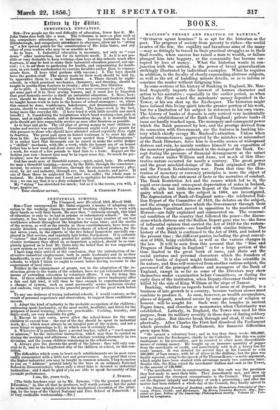Iffirrs to tOt etitnr.
INDUSTRIAL EDUCATION.
Stn—Few people see the real difficulty of education, fewer face it. Mr. John Oates does both like a man. The trilemma is now—a plan such as his, compulsory attendance, or barbarism. Leaving barbarism to Lord Ellenborough, and compulsory attendance in abeyance, allow me to " string up " a few special points for the consideration of Mr. John Oates, and any other of your readers who may be as sensible as he.
As to boys. 1. Industrial education is necessary, not only to " coax down" other instruction, but for its intrinsic merit. 2. As it is not pos- sible or very desirable to keep working-class boys at day-schools much after fourteen, it may be best to make their industrial education general, not spe- cial ; i. e. to set them to gardening for health, and carpentering for handi- ness, as you teach mathematics to exercise faculties rather than to commu- nicate facts. (I have tried gardens with success.) 3. The boys should have the garden-stuff. The money made by their work should be laid by, to apprentice them to a trade at fourteen. 4. There ahould.be night- schools, in which practical mechanics, chemistry, and drawing, should be taught youths from fourteen to twenty; after them, free libraries. As to girls. 1. Industrial training is even more necessary to girls ; they get some part of it in their sewing lessons, and it must not be forgotten that good domestic service is itself an industrial education. 2. More, how- ever, should be done at school. Girls between twelve and fourteen should be taught house-work in turn in the houses of school-managers ; or, where this cannot be done, washhouses, bakehouses, and dressmaking establish- ments, should be connected with the school. The house-work is the best, being more like everyday life. (I have tried it with little trouble and much benefit.) 3. Considering the temptations which beset working-class girls at home, and at night schools, and at dressmaking shops, it is desirable that girls should get into respectable service as soon after fourteen as possible. As to boys and girls. The old plan of giving money to start children in trades and service was excellent. Government might well give grants for this purpose to those who should have attended school regularly from eight to fourteen. The great pull upon an honest workman is to start his chil- dren in life. An apprentice-fund is more needed than "Reformatories." It is rather hard that thousands can be raised to make the artful dodger " skilled" mechanic, with 308. a week, while the honest son of an honest father has to hew wood and draw water for the "skilled" dodger upon 12s. a week, for want of a few pounds to bind him to a trade. Rogues are the fashion just now—honest men may be in vogue some day. So much for par- ticulars; now for universals.
God has made man of threefold nature,—spirit, mind, body. He ordains for man a threefold training,—moral, by the Bible, through the conscience ; mental, by science and literature, through the reason and memory ; phy- sical, by art and industry, through eye, ear, hand, muscle, and nerve. If one of these three be neglected the other Iwo suffer ; the whole man is maimed. Mr. John Oates and I need not to apologize for industrial educa- tion ; we can say that it is a duty ordained by God.
My " string " has stretched too much ; but as it is the recess, you will, I hope, forgive me.


























 Previous page
Previous page